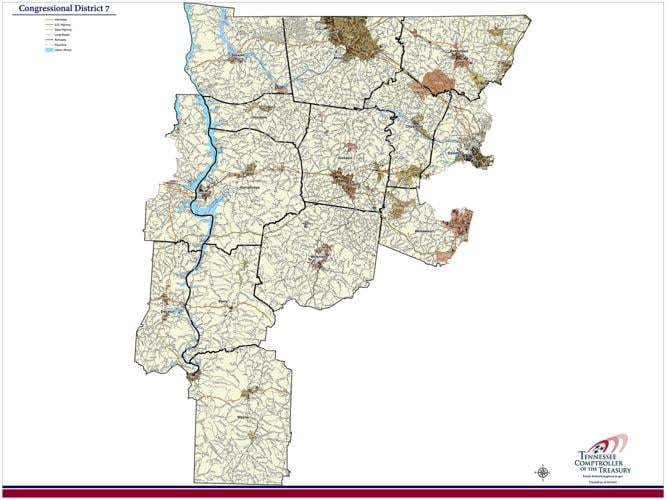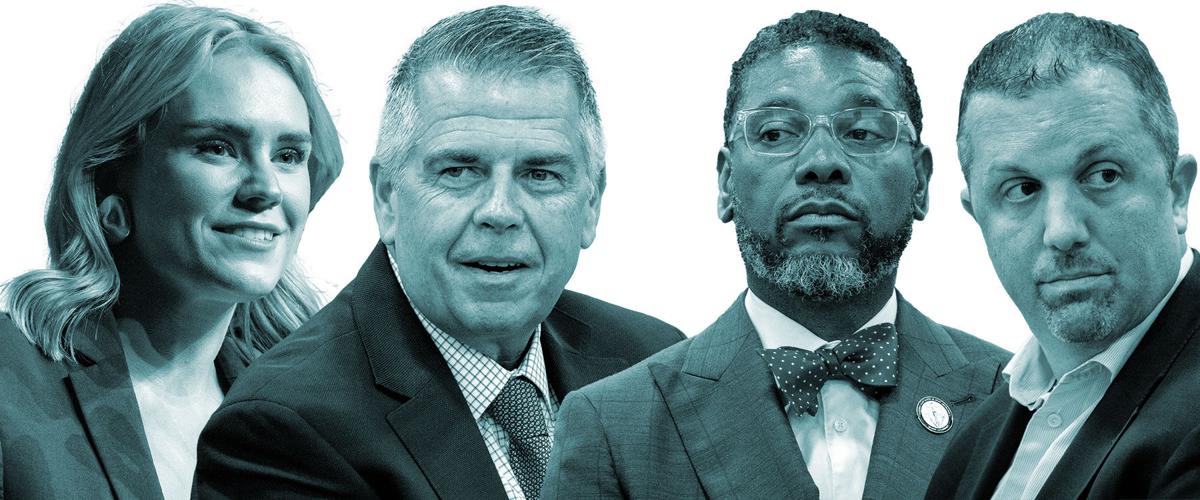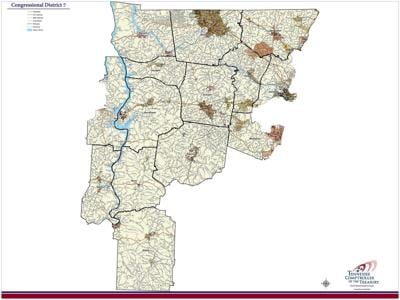In July, just eight months after winning reelection, Republican U.S. Rep. Mark Green resigned from his seat representing Tennessee’s 7th Congressional District — a district that, since 2022’s redistricting, has included a large swath of Davidson County. In the race to take Green’s seat, the crowded Republican slate features four clear frontrunners: state Reps. Jody Barrett, Lee Reeves and Gino Bulso, alongside former commissioner of Tennessee’s Department of General Services and U.S. Army Ranger Matt Van Epps.
Other GOP candidates include now-pardoned Jan. 6 insurrectionist Stewart Parks; Metro Nashville Police Department Detective Joe Leurs; businessman Stuart Cooper; former Tennessee state Senate staffer Tres Wittum, who unsuccessfully ran for the Republican nomination in Tennessee’s 5th Congressional District race in 2022; Montgomery County Commissioner Jason Knight; 28-year-old political newcomer Mason Foley; and businessman Adolph Agbéko Dagan.
Democratic candidates include state Reps. Bo Mitchell, Vincent Dixie and Aftyn Behn — all of whom represent Nashville districts — as well as political strategist Darden Copeland.
Independent candidates include Teresa “Terri” Christie, Bobby Dodge, Robert James Sutherby and Jon Thorp.
The 7th District primary will take place Oct. 7 (early voting Sept. 17-Oct. 2), with the general election to follow on Dec. 2 (early voting Nov. 12-26).

From left: Rep. Gino Bulso, Matt Van Epps, Rep. Jody Barrett, Rep. Lee Reeves
Top Issues, First Bills
Each Republican candidate has been working to convince voters that he (all 11 are men) stands above the others as the “true conservative” and the most MAGA candidate — or at least the one who could push President Donald Trump’s agenda the furthest in the House of Representatives. All the Republican front-runners support the potential deployment of the National Guard in Memphis — something considered by Trump as he continues to deploy soldiers in Democratic-leaning cities, allegedly to combat crime.
Reeves was elected to the state House in 2024 following a flood of out-of-state PAC money and an endorsement from Gov. Bill Lee. His short tenure before launching yet another campaign has been a source of criticism from his opponents. Reeves has said that if elected, his first bill would end birthright citizenship for children of undocumented immigrants — despite the fact that a bill with that aim was already filed by Republicans months ago. Reeves argues that the current bill hasn’t been passed, and pitches himself as an effective legislator who can actually get bills moved through the House. He has promised to “demagnetize” Tennessee in regard to illegal immigration.
Bulso, a self-described “culture warrior” in the state House, says he’s running to “give the people the type of government that their founders pledged their lives, their honors and their sacred fortunes for.” The Brentwood Republican says his first piece of sponsored legislation would require the federal government to pass a balanced budget.
“Our opposition is our own federal government that has grown in scope way beyond the powers that were properly delegated to it by our Constitution,” Bulso says.
More than a dozen Republicans and Democrats have kicked off campaigns to replace former U.S. Rep. Mark Green
Barrett says his top issue is ensuring federal “election integrity,” but that his first sponsored bill would aim to replicate Tennessee’s ban on gender-affirming care for trans youth at the national level. Barrett claims trans people “have been sold a bill of goods and been damaged,” and that “the rage that comes out is what manifests itself in these school shootings and the violence.” He has also touted his anti-school-voucher stance: During this year’s special session, Barrett stood apart from Gov. Bill Lee and Republican leadership in opposition to the largely GOP-backed voucher legislation.
Van Epps has said the first bill he intends to sponsor will be “to support veterans,” citing issues such as investing in child care and health care for vets. He has also pitched a “12-month tax-free [period] for veterans” who are transitioning out of the military.
While the Democratic candidates will of course publicly state that they intend to win the race, privately, many Democrats acknowledge that the uphill battle is more akin to scaling a political mountain.
“Davidson County only represents about 20 percent of this district,” Mitchell told the Scene in July. “This race is going to be won or lost — in the primary and the general — once you cross the Davidson County line.”
That doesn’t mean Democrats aren’t putting up a fight. Behn — a longtime community organizer, one of the youngest candidates on either side and the only woman in the race — has made several national television appearances in recent weeks. Some Democrats have privately criticized Behn’s presence in the race as a means of elevating her national profile, pointing out that she doesn’t actually live in the 7th.
“In the most MAGA-gerrymandered congressional district in the country, I live walking distance from the line,” Behn told the Scene in late July, adding that she’ll move to the district if she wins and arguing that “this moment requires people like me who offer fearless leadership and meet the moment.”
All four Democratic candidates list expanding access to health care, education and child care among their top priorities, as well as addressing affordability in housing and groceries. During a Sept. 7 forum in Fairview, all four criticized the Trump administration’s deployment of the National Guard in blue cities and signaled support for comprehensive immigration reform. They all pledged to hold regular town halls, if elected.
“I am the candidate that’s going to inspire a lot of young people to get involved in Tennessee politics,” Behn said during the forum. “I’m the candidate that’s going to bring a national political apparatus with us to mobilize the votes and money necessary to defeat the Republicans.”
Mitchell says his strategy includes leaning on his existing relationships with community leaders in the 7th District. “I’m not having to introduce myself or convince anybody,” he says, “and in a short timespan like this, that kind of gives me an advantage.”
“This is a real opportunity like we’ve never had in a long time in Tennessee,” Mitchell says.
“People have to understand that their lives are literally at stake right now,” says Dixie. “And getting them to understand the severity of what this vote means — we have to get people out to vote for people who represent their interests.”
“This is an opportunity to get someone in that seat that’s not going to just be a rubber-stamp just because of whoever the president is,” Dixie says.
In taking on three elected state representatives with more name recognition, Copeland says he’s “not afraid of a challenge” and pitches himself as a “coalition builder.” He says the passage of Trump’s “Big Beautiful Bill” and the defunding of public media are both important issues and examples of opportunities to stop Republican efforts to chip away at public institutions and initiatives.
“We need to pick up this seat, and we can’t give [Republicans] another year of winning votes and cutting working-class and bread-and-butter issues and funding out of what’s been approved by Congress,” Copeland says. “They’re winning by one and two and three votes, so this election really matters.”
“We’re at a point where politicians are picking their voters and not letting voters pick their politicians,” Copeland told the Scene at the Fairview forum. “But I think that’s the reason that I’m going to every corner of the district.”
Dixie says he can mobilize Black voters in Nashville.
“I think that for all of the Democrats, the strategy lies within the top three populous counties, which are Montgomery, Williamson and Davidson,” Behn said at the forum. “So I think a lot of the organizing has to happen in these three counties to mobilize voters. For the most part, these are highly engaged, highly educated voters who just need the right information, and a lot of them don’t even know there’s a special election going on.”

From left: Rep. Aftyn Behn, Rep. Bo Mitchell, Rep. Vincent Dixie, Darden Copeland
Endorsements
Barrett has earned endorsements from conservative nonprofit Tennessee Stands, country musician John Rich (his childhood friend) and the House Freedom Fund, a wing of the Freedom Caucus. Reeves has been endorsed by every Williamson County mayor, Knox County Mayor Glenn Jacobs, state Senate Majority Leader Jack Johnson (R-Franklin) and the Newt Gingrich-founded GOPAC organization. Bulso touts an endorsement from NASCAR Hall of Fame member and Franklin businessman Darrell Waltrip. Van Epps, the first Republican to enter the race, was endorsed by Green, with whom he served in a special operations regiment.
In recent weeks, some Republicans have become more comfortable publicly criticizing Green, from his abandonment of the seat for a private-sector job to his contentious and high-profile divorce. Some Republican candidates have made a point to distance themselves from Green. Van Epps says, despite any criticism some of his fellow candidates may have of Green, he’s “honored to have his endorsement and excited that he’s behind our campaign.”
Mitchell has been endorsed by a slew of unions, including the Nashville Ironworkers 492, Teamsters Local 480, Brotherhood of Locomotive Engineers and Trainmen, and the Plumbers, Fitters, Welders and Service Technicians Local Union. He has also earned the support of former 5th District U.S. Rep. Bob Clement and Nashville's Democratic state Sen. Heidi Campbell.
Dixie has been endorsed by his fellow Democratic state Rep. Justin Pearson of Memphis, while Behn has been endorsed by Her Bold Move, an organization that supports women candidates.
In 2022, Tennessee’s Republican supermajority carved Nashville into three new congressional districts. Here’s how that has played out since.










